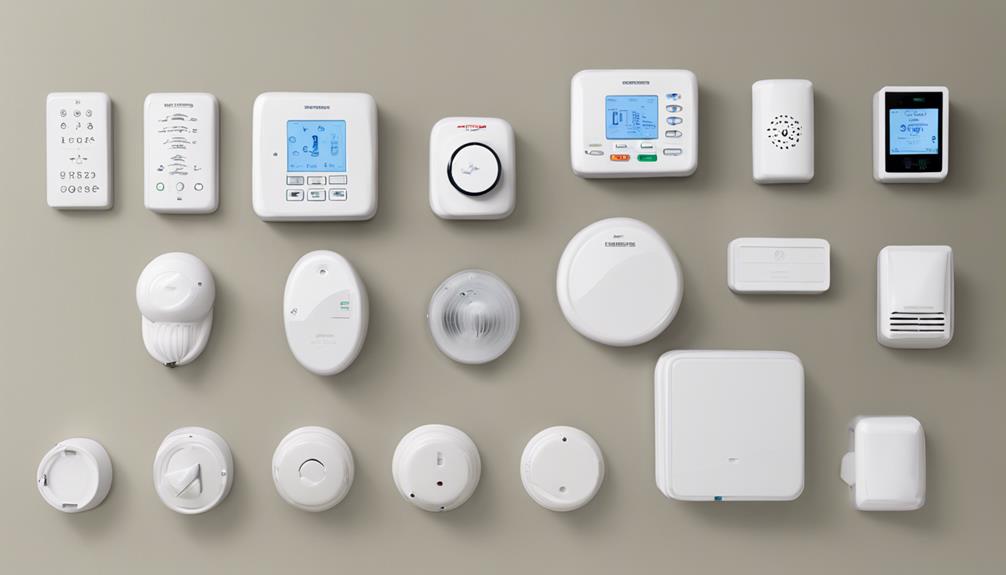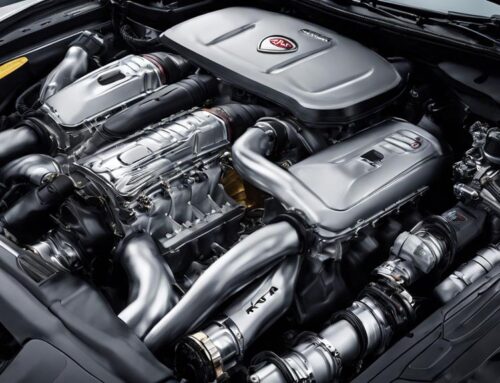Discover various residential alarms like fire, carbon monoxide, flood, and burglar systems. Fire alarms guarantee early detection, while interconnected systems boost safety. Carbon monoxide alarms are essential near bedrooms, signaling danger with loud alerts. Flood alarms use sensors to detect leaks, offering peace of mind. Burglar alarms with sensors detect intrusions, alerting you promptly. Wired setups provide reliable connections but wireless systems offer easy installation. Monitored systems assure 24/7 surveillance for quick responses. Unmonitored ones come cost-effective but require your attention. Each alarm type has its benefits; find the best fit to safeguard your home.
Key Takeaways
- Fire, carbon monoxide, flood, and burglar alarms are common types for residential safety.
- Wired systems offer reliability but with higher installation costs.
- Wireless systems provide flexibility and easy installation.
- Monitored systems offer professional surveillance and emergency response.
- Unmonitored systems are cost-effective but require homeowner management for alerts.
Fire Alarm Systems
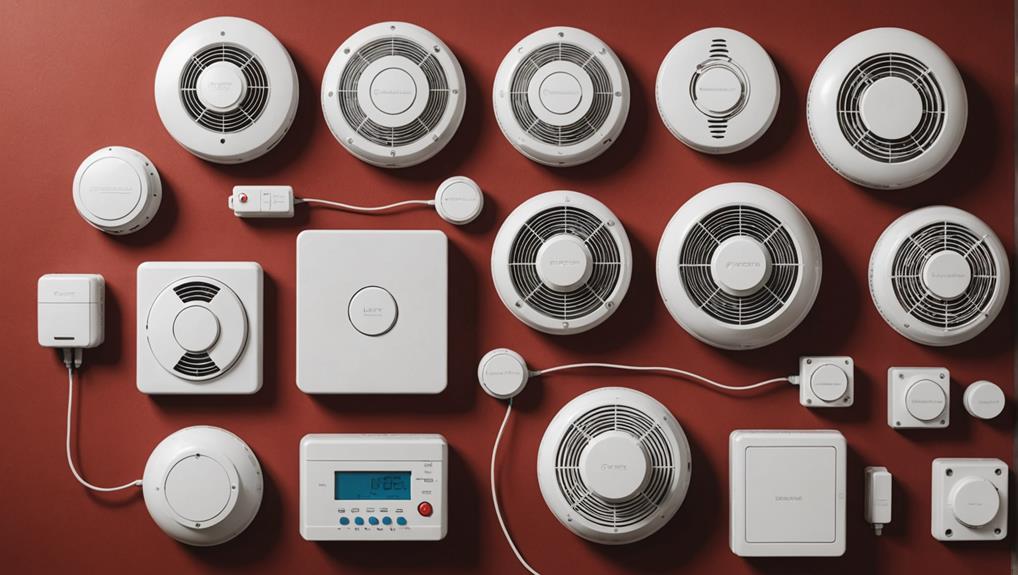
When considering residential alarms, fire alarm systems play an essential role in guaranteeing the safety of your home and loved ones. These systems are designed to provide early warning in the event of a fire, with components like smoke detectors strategically placed throughout the house.
In addition to smoke detectors, carbon monoxide detectors are also vital for a thorough home security system. It's important to have smoke alarms on every level of your home, particularly outside sleeping areas, to maximize occupant safety. Interconnected alarms further enhance this safety by triggering all alarms in the house when smoke is detected, alerting everyone simultaneously.
Regular maintenance is key to the reliable performance of fire alarm systems. Remember to test and replace batteries in smoke alarms annually to verify they function correctly during emergencies.
For added peace of mind, consider installing monitored fire alarm systems that can automatically alert both occupants and emergency services in case of a fire, potentially reducing response times and minimizing damage.
Wired Alarm Systems
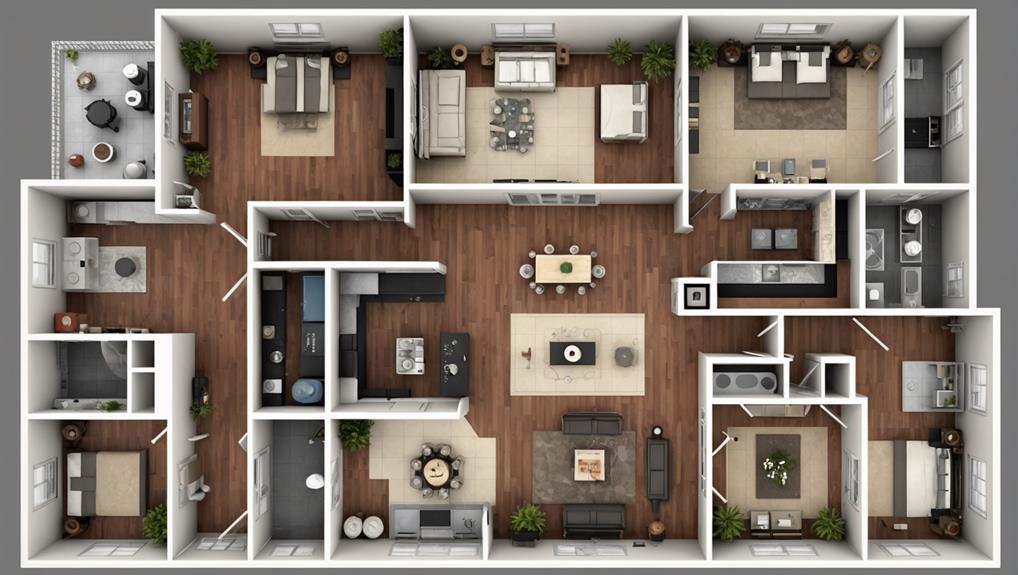
Considered a traditional yet robust option for residential security, wired alarm systems offer a reliable solution for safeguarding your home and loved ones.
These systems are hardwired to a central control panel, ensuring a secure and stable connection that's less susceptible to interference or signal loss, unlike wireless alternatives. Wired systems are known for their reliability, providing consistent performance over long periods.
While the installation of wired alarm systems may require professional assistance and involve higher initial costs due to extensive wiring, they generally have lower long-term maintenance expenses.
However, it's important to note that wired systems can be vulnerable to failure if the wires are damaged or cut, potentially compromising their effectiveness. Additionally, once installed, these systems can be challenging to expand or modify, limiting flexibility for future security needs adjustments.
Despite these limitations, statistics show that homes with wired alarm systems are less likely to be targeted by burglars, contributing to decreased crime rates in monitored neighborhoods.
Wireless Alarm Systems
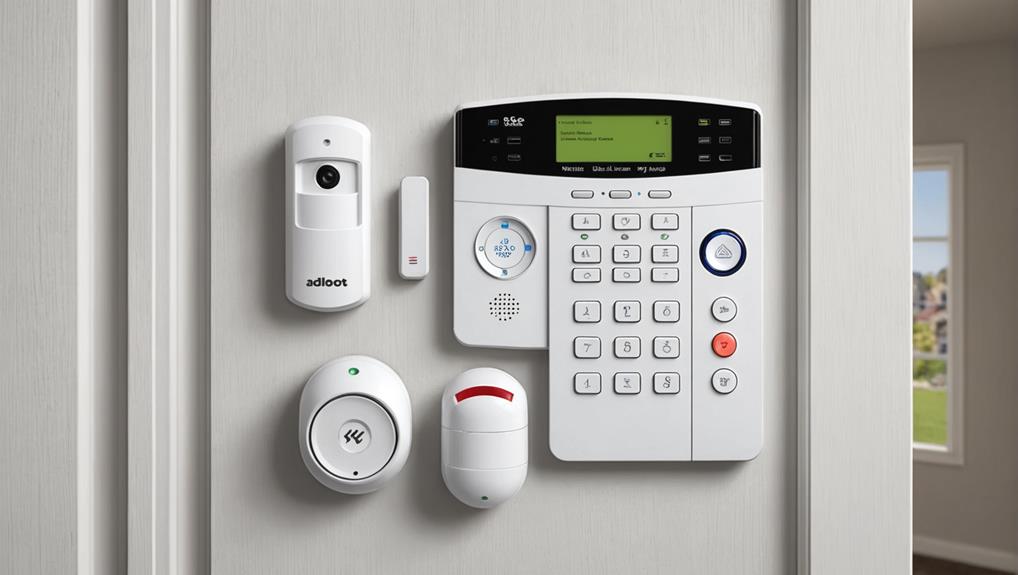
A popular choice for modern homeowners, wireless alarm systems offer a convenient and flexible solution for home security. Operating through radio frequencies, these systems eliminate the need for hardwired connections, making installation and relocation easier without extensive wiring.
While ideal for smaller properties, they may face limitations in component distance, affecting performance. One of the strengths of wireless systems is their ease of installation, which often allows for DIY setup, reducing initial costs.
However, to guarantee system security, regular battery checks and security protocol updates are essential due to vulnerability to hacking. Many wireless alarm systems provide remote access and monitoring via smartphone apps, enabling users to have greater control over their home security.
The flexibility of wireless systems often allows for DIY installation, reducing initial setup costs compared to wired systems. For peak performance and peace of mind, consider consulting security professionals for advice on securing your wireless alarm system effectively.
Monitored Alarm Systems
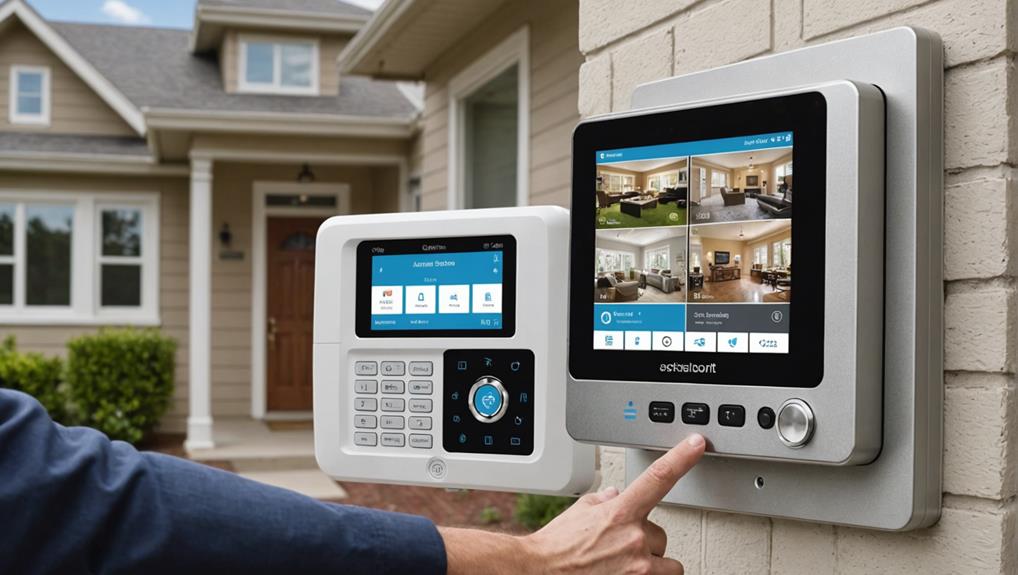
As you explore residential alarm options, shifting from wireless systems to monitored alarm systems reveals a heightened level of security and professional surveillance for your home.
Monitored alarm systems offer peace of mind through 24/7 surveillance by security professionals, ensuring swift emergency response in case of any security breach or alarm activation. These systems are part of various residential security systems that cater to different protection needs.
Here's what makes monitored alarm systems stand out:
- Comprehensive Protection: Monitored systems not only cover burglar alarms but also include monitoring for fire alarms and carbon monoxide detectors, enhancing the safety net for your property.
- Professional Monitoring: With monthly subscription fees, these systems provide access to professional monitoring services that verify alarms and promptly dispatch authorities if needed, bolstering security measures.
- Reliable Emergency Response: In situations where verification is unsuccessful, emergency responders such as police or fire departments are immediately notified, ensuring a swift and effective response to any potential threats.
With a monitored alarm system, you can rest assured that your home is under constant watch, ready to respond in case of any emergencies.
Unmonitored Alarm Systems
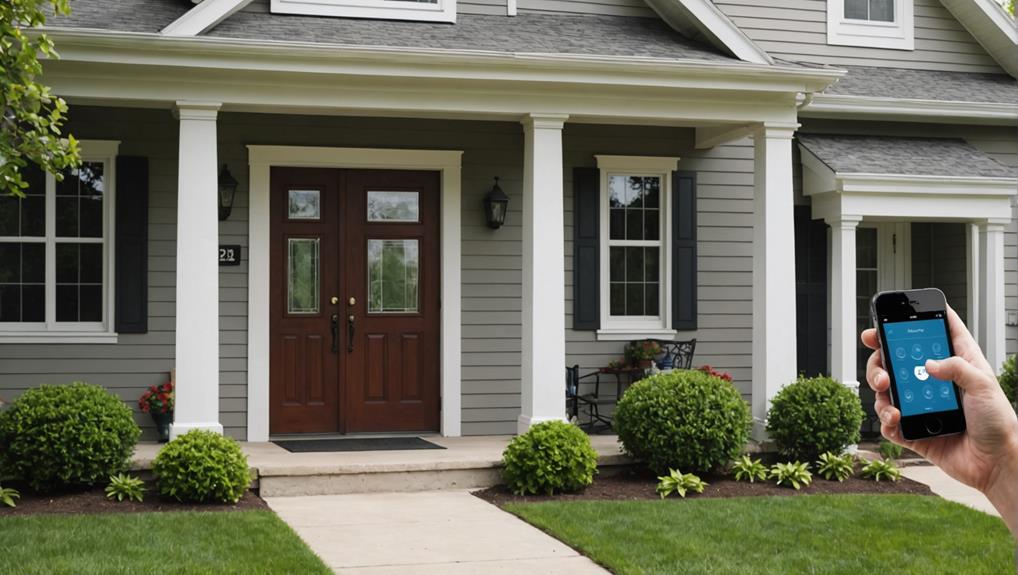
With unmonitored alarm systems, you take charge of managing alerts directly, receiving notifications without professional monitoring.
These systems offer cost-effective security solutions by eliminating monthly fees associated with monitoring services. Additionally, they can be paired with affordable security devices to further enhance your home safety.
However, it's essential to evaluate potential delays in response times since you're responsible for reacting to alerts promptly.
Self-Managed Alarm Alerts
Unmonitored alarm systems, also known as self-managed alarm alerts, offer property owners a direct notification method when security breaches occur.
These systems are cost-effective and provide a sense of control over your home's security. Here are some key points to reflect on:
- Direct Alerts: Unmonitored systems notify you directly through sirens or lights, allowing you to take action promptly.
- Affordability: With no monthly monitoring fees, these systems are budget-friendly and ideal for those looking to save on security costs.
- Mobile Notifications: Many unmonitored alarms offer mobile app alerts, keeping you informed of any security events on your smartphone.
While these systems empower homeowners with immediate alerts, it's crucial to remember that they rely on your response.
In emergency situations, response times may be slower compared to monitored systems that automatically alert local authorities.
Reflect on the level of risk in your area when deciding if self-managed alarm alerts are the right choice for your home.
Cost-Effective Security Solutions
When considering home security options, unmonitored alarm systems stand out as a cost-effective solution for budget-conscious homeowners.
These systems are affordable, with no monthly fees, making them an ideal choice for those looking to deter crime without breaking the bank. Unmonitored alarm systems typically rely on loud sirens or flashing lights to alert you and your neighbors of potential intrusions, providing immediate notification without the need for professional monitoring.
Especially suitable for low-risk areas or remote locations, these systems allow homeowners to manage their own responses and often come with simple DIY installation options. Additionally, many unmonitored alarm systems offer the convenience of mobile apps, enabling you to receive instant alerts on your smartphone even when you're away from home.
Response Time Considerations
Relying solely on loud sirens or flashing lights for alerts, unmonitored alarm systems place the onus of response directly on property owners.
When considering response time in emergencies, it's essential to understand the implications of choosing unmonitored systems over monitored ones. Here are some important points to keep in mind:
- Unmonitored alarm systems require immediate action from property owners upon receiving an alert, potentially leading to delays in notifying law enforcement.
- Response time for unmonitored systems depends heavily on the homeowner's ability to recognize the emergency and take appropriate security measures promptly.
- In contrast, monitored systems offer a quicker response time by alerting occupants and emergency services simultaneously, providing a more efficient way to handle security breaches.
Carbon Monoxide Alarm Systems
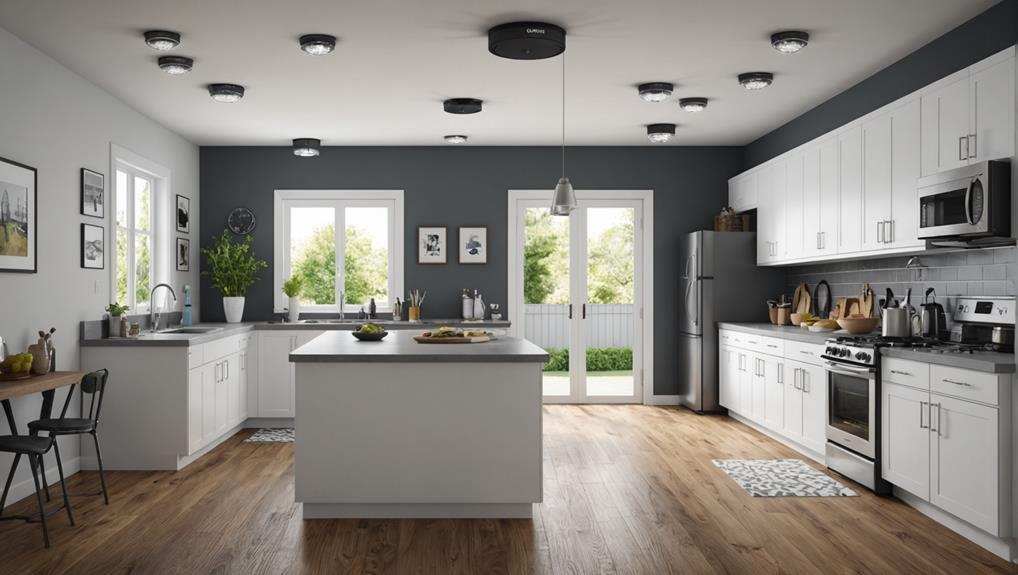
Essential for safeguarding your home against the silent threat of carbon monoxide, carbon monoxide alarm systems are indispensable devices that can save lives.
These alarm systems are critical for detecting harmful levels of carbon monoxide gas, which is colorless and odorless, posing a serious health risk.
It's recommended to install carbon monoxide alarms on every level of your home, especially near sleeping areas, to guarantee prompt alerts in case of dangerous gas accumulation.
When unsafe CO levels are detected, these alarms emit a loud beep or chirp, signaling the need for immediate action like evacuation and seeking fresh air.
Remember to conduct regular testing and maintenance of your carbon monoxide alarms to confirm they function effectively and provide reliable safety warnings.
Additionally, consider modern options that integrate carbon monoxide alarms into smart home systems, enabling you to receive alerts on your smartphone and monitor CO levels remotely for enhanced peace of mind.
Burglar Alarm Systems
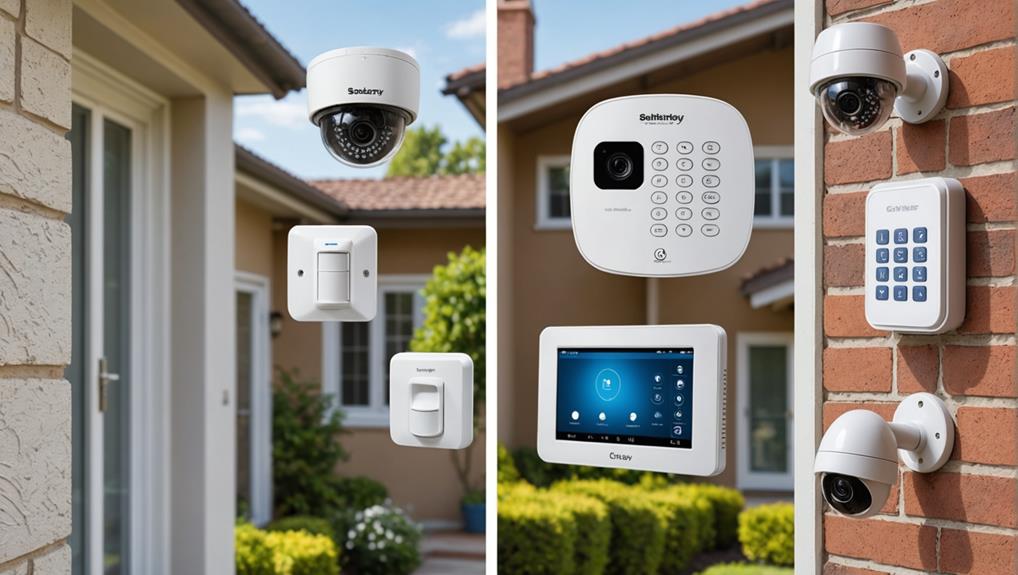
When considering burglar alarm systems, it's crucial to understand the components and installation considerations.
These systems typically include door/window sensors and motion detectors to detect unauthorized entry.
Additionally, modern burglar alarm systems often come with smart home integration, allowing you to control and monitor your security system remotely via a smartphone app.
Alarm System Components
Among the key components of burglar alarm systems are sensors, motion detectors, a control panel, alarm sirens, and monitoring services.
- Sensors: Door and window sensors detect unauthorized access, alerting you to potential intrusions.
- Motion Detectors: Strategically placed to monitor movement, these devices distinguish between pets and intruders to minimize false alarms.
- Control Panel: The central hub receives signals, allowing you to arm or disarm the system and manage settings.
Motion detectors guarantee thorough coverage, while alarm sirens serve as a powerful deterrent against burglars.
The control panel provides easy access to system functions, enhancing user control.
Additionally, connecting your system to monitoring services guarantees rapid response in case of an alarm.
Understanding these components empowers you to protect your home effectively and maintain peace of mind.
Installation Considerations
For ideal security, strategically installing burglar alarm systems is vital.
When setting up your alarm system, confirm sensors cover all entry points like doors and windows for extensive protection.
Professional installation is advisable for wired systems to prevent wiring issues and guarantee proper functionality. Wireless systems can be DIY projects for easier setup.
Place motion detectors thoughtfully, considering your home's layout and potential pet movements to prevent false alarms. Opt for pet-friendly motion sensors when needed.
Regular maintenance checks are important. Test the alarm system periodically and replace batteries to keep it operational and effective in deterring intruders.
Familiarize yourself with the control panel and response procedures to reduce false alarms and promote quick responses to actual breaches.
Proper installation and maintenance are key to maximizing the effectiveness of your burglar alarm system.
Flood Alarm Systems
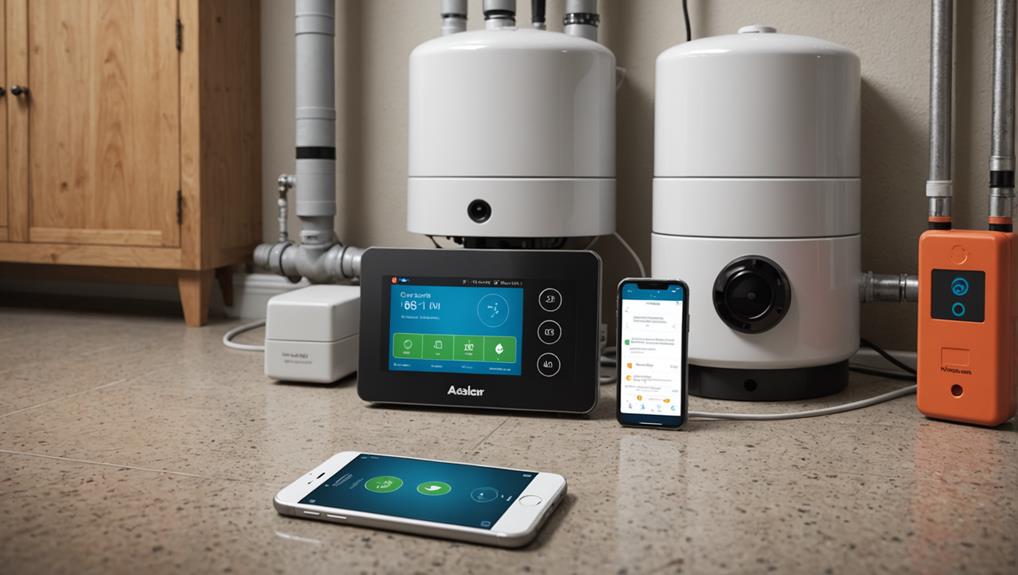
Flood alarm systems play an essential role in safeguarding your home against potential water damage. These systems are designed to detect water leaks and rising water levels, alerting homeowners promptly to prevent costly repairs.
Here are some key points about flood alarm systems:
- Moisture Sensors: Flood alarms use moisture sensors strategically placed in areas prone to flooding, such as basements and bathrooms, to detect water leaks early on.
- Alerting Homeowners: When water is detected, these systems emit loud sirens or send alerts to mobile devices, enabling quick responses to mitigate potential water damage.
- Smart Home Integration: Some modern flood alarm systems can be integrated with smart home technology, allowing for remote monitoring and notifications through a smartphone app.
This feature provides added convenience and peace of mind for homeowners looking to protect their homes from water-related issues.
Frequently Asked Questions
What Are the Different Types of Home Alarms?
There are various types of home alarms available to protect your property and loved ones.
Burglar alarms alert you to unauthorized entry, while fire alarms provide early warnings of fires.
Carbon monoxide alarms monitor dangerous gas levels, and water leak alarms detect potential flooding.
Smart alarms offer remote monitoring through smartphones for added security.
Each type serves a unique purpose in keeping your home safe and secure.
What Type of Alarms Should a House Have?
For maximum protection, your house should have burglar alarms to deter break-ins, smoke alarms on every floor for fire detection, carbon monoxide detectors near bedrooms and fuel-burning appliances, and flood alarms to prevent water damage.
Combining these alarms with monitored systems increases safety. Professional monitoring guarantees immediate alerts to authorities during emergencies, enhancing response times and overall security for your home and loved ones.
What Are the Three Main Types of Alarm Systems?
You should have intrusion detection systems for home security, fire alarms for early fire detection, and carbon monoxide alarms to warn against this deadly gas.
Each plays an essential role in keeping your home and loved ones safe. Make certain all three types of alarms are installed and regularly maintained to guarantee thorough protection for your household.
Your safety is a top priority, and these alarms are key to maintaining it.
What Is the Most Basic Type of Security Alarm System?
The most basic type of security alarm system is a burglar alarm. It's designed to detect unauthorized entry with sensors on doors and windows.
These systems usually have motion detectors that can tell pets from intruders, reducing false alarms. When triggered, a basic burglar alarm blares a loud siren to alert you and your neighbors.
Many can be self-installed, making them affordable and accessible for homeowners. External alarm boxes can also deter break-ins by up to 60%.
Conclusion
To sum up, there are various types of residential alarms available to help keep your home safe and secure. From fire alarms to burglar alarms, carbon monoxide detectors to flood alarms, there is a system that can meet your specific needs. Whether you prefer a wired or wireless system, monitored or unmonitored, it's important to have some form of protection in place to alert you of any potential dangers in your home. Stay safe and secure with the right residential alarm system for you.

